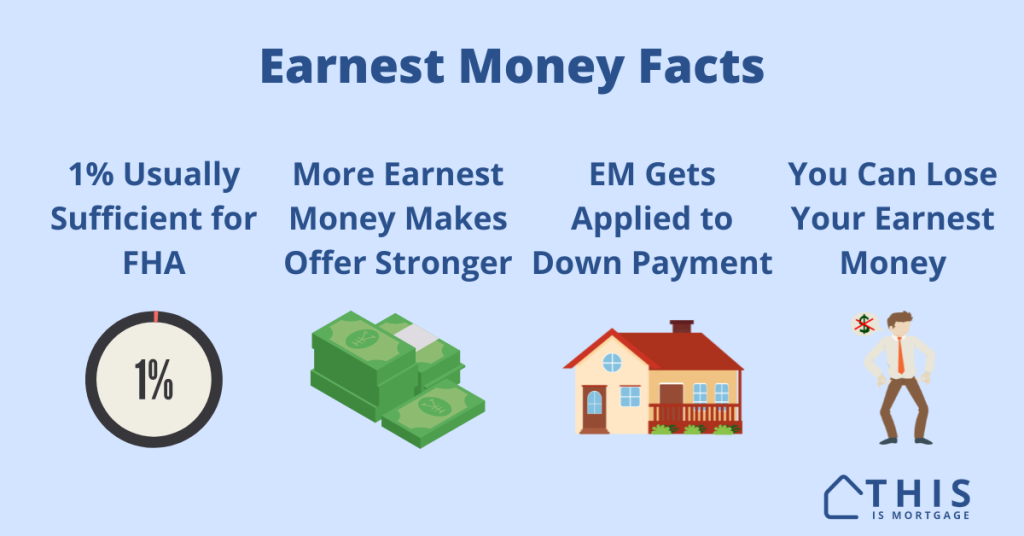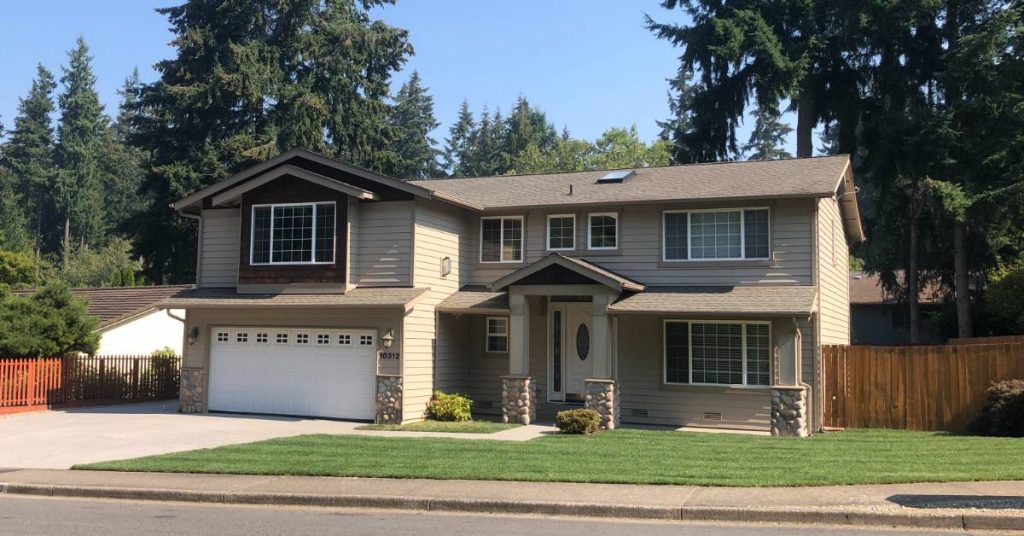Earnest money shows the seller you’re serious about buying their property.
You write a check as soon as you receive an accepted offer. That money sits at the escrow company until it’s applied to the down payment and closing costs at the end of the transaction.
But if you back out of the sale without a legitimate reason, the seller can keep your earnest money.
That’s why a bigger earnest money check helps your offer get accepted. You won’t likely back out of a sale if it will cost you $5,000 or $10,000 to get out of the deal.
So, how much earnest money is enough for an FHA loan, or any loan type? Let’s find out.
See if you qualify for FHA. Speak with a licensed lender here.
How much earnest money do you need for FHA?
FHA doesn’t set a minimum earnest money deposit. Rather, you and your real estate agent will determine your earnest money amount based on the local market.
In a competitive market, you might deposit $5,000 to $10,000 or even more. But for a low-demand home, $500 might suffice.
Sellers don’t usually think about earnest money in percentages. But you might consider about 1% sufficient for FHA. You will put a dollar amount on the purchase agreement in an area of the contract that reads like the following:
__________________________
Earnest Money
A good faith deposit of __________ U.S. Dollars ($______) (the “Earnest Money”) shall be payable to ______(Escrow Agent) in the form of ☐check ☐certified funds ☐money order ☐cash.
__________________________
It’s, frankly, guesswork to know exactly how much earnest money to pay. You don’t want to make your offer look weak, but you should avoid risking all your cash, too.
Start your FHA pre-approval by finding your lender.
Does a large earnest money deposit help your FHA offer get accepted?
If a seller receives multiple offers, they often remove FHA ones, even ones with big earnest money. This is a cold, hard truth in today’s market.
But this isn’t always the case. The seller looks at all the offers if they get just one, two, or three. A large earnest money deposit could make your offer stand out.
For example, you’re buying a $200,000 house. You’ve received a fully-underwritten pre-approval from your lender and the home looks solid. You’re confident the sale will go through.
You could offer $10,000 in earnest money – 5% of the sales price. This could catch the seller’s eye and let them know you’re a serious and confident buyer. This could even win out over a conventional offer with just $500 in earnest money.
How and when do you pay earnest money?
You make your earnest money payment by check, money order, or wire. You must have the earnest money on hand when you make an offer. You pay earnest money within a day or two of getting an accepted offer.
It does not go to the seller directly. Rather, the escrow company holds it.
The escrow company divvies up money to the appropriate parties at closing.
Does FHA require proof of the earnest money source?
The lender will verify the source of your earnest money if it’s greater than 1% of the sales price or “excessive based on the borrower’s history of accumulating savings.”
So, the lender might ask you to verify $500 or $1,000 in earnest money even if it’s less than 1% of the home price.
You need to provide:
- A copy of the check
- Verification from escrow that the funds were received
- Bank statement or third-party verification showing sufficient funds at the time of the deposit
You can use gift funds for your down payment, but you must receive a gift letter and follow other gift guidelines.
Connect with a lender to see how to verify your earnest money.
What happens to your earnest money?
Your earnest money can end up in one of three places:
- Applied to your down payment and closing costs
- Refunded under certain conditions defined in the sale contract
- The seller keeps it if the sale falls through for a reason not defined in the sale contract
Let’s dive into each scenario.
Applied to your down payment: If all goes according to plan, the earnest money is applied to your final closing bill. For example, if your down payment and closing costs total $10,000 at the end of the transaction and you paid $1,000 in earnest money, you’ll only have to pay $9,000 to escrow at closing.
Refunded to you: The purchase contract defines some conditions or “contingencies” where your earnest money can be refunded. For example, the inspection reveals $25,000 worth of termite damage. The inspection contingency allows you to back out of the purchase without penalty. Contingencies come with expiration dates, though. At a certain point, you can’t get your money back.
The seller pockets the money: In rare cases, the sale might fall through for a reason not defined in the purchase contract. For example, you have to move out of state unexpectedly or your financing falls through at the last minute. The seller has the right to keep your earnest money. Often, the seller will give you an extension if the sale is taking longer than expected. But if you simply back out due to cold feet, the seller will pocket the money.
Protecting your earnest money
There are some simple things you can do to make sure you don’t lose your earnest money.
Get a fully-underwritten pre-approval: Lenders can take in your documentation and review your file before you find a property. It’s helpful to know you’re fully approved and financing likely won’t fall through later.
Get an inspection right away: Your agent will build in an inspection contingency that expires one or two weeks from the offer date. Get your inspection done fast so you can back out or renegotiate the offer terms if major issues turn up.
Add as many contingencies as you can. This gives you multiple ways out of the sale. For example, a financing continency lets you back out because the lender won’t approve the loan. An appraisal contingency lets you walk away if the home doesn’t appraise for the purchase price. Just don’t go overboard with contingencies; the seller could simply accept another offer with fewer.
Make a firm decision. Some buyers back out simply due to cold feet. Resolve in your heart and mind that you want to buy this home and move forward with speed and confidence, not second-guessing your decision.
Earnest money: a powerful tool in today’s market
Despite high mortgage rates, seller are still receiving multiple offers. The right amount of earnest money could get your offer accepted.
Work with your real estate agent and lender to offer the perfect earnest money deposit.




